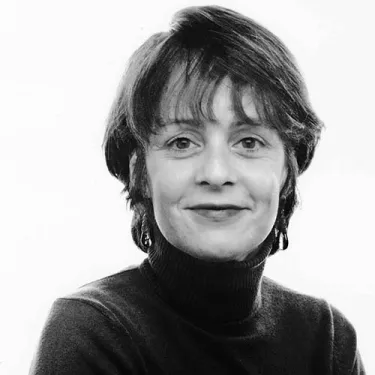Mary Jo Salter
Visiting Poet

Educated at Harvard and at Cambridge University, Mary Jo Salter is celebrated for her inventive uses of traditional forms and has received many awards, including a recent year in France on an Amy Lowell Poetry Traveling Scholarship. Salter is author of four collections, Henry Purcell in Japan (1985), Unfinished Painting (the 1989 Lamont Selection for the year’s most distinguished second volume of poetry), Sunday Skaters (1994), and A Kiss in Space (1999), as well as a children’s book, The Moon Comes Home (1989). Carolyn Kizer wrote of A Kiss in Space: “These are poems of breath-taking elegance: in formal control, in intellectual subtlety, in learning lightly displayed.”
An editor of The Norton Anthology of Poetry and an Emily Dickinson Lecturer in Humanities at Mount Holyoke College, Salter lives in South Hadley, Massachusetts, with her husband, the writer Brad Leithauser, and their two daughters.
Select Poems
From up here, the insomniac
river turning in its bed
looks like a line somebody painted
so many years ago it’s hard
to believe it was ever liquid; a motorboat
winks in the sun and leaves a wake
that seals itself in an instant, like the crack
in a hardly broken heart.
And the little straight-faced houses
that with dignity bear the twin
burdens of being unique and all alike,
and the leaf-crammed valley like the plate
of days that kept on coming and I ate
though laced with poison: I can look
over them, from this distance, with an ache
instead of a blinding pain.
Sometimes, off my guard, I half-
remember what it was to be
half-mad: whole seasons gone; the fear
a stranger in the street might ask
the time; how feigning normality
became my single, bungled task.
What made me right again? I wouldn’t dare
to guess; was I let off
for good behavior? Praise
to whatever grace or power preserves
the living for living…Yet I see the square
down there, unmarked, where I would pace
endlessly, and as the river swerves
around it, wonder what portion of
love I’d relinquish to ensure
I’d never again risk drowning.
From A KISS IN SPACE (Alfred A. Knopf, 1999)
That autumn we walked and walked around the lake
as if around a clock whose hands swept time
and again back to the hour we’d started from,
that high noon in midsummer years before
when I in white had marched straight to my place
beside you and was married and your face
held in it all the hours I hoped to live.
Now, as we talked in circles, grim, accusing,
we watched the green trees turning and losing
one by one every leaf, those bleeding hearts.
And when they all had fallen, to be trod
and crumbled underfoot, when flaming red
had dulled again to dun, to ash, to air,
when we had seen the other’s hurts perfected
and magnified like barren boughs reflected
upside-down in water, then the clouds
massed overhead and muffled us in snow,
answered the rippling lake and stopped the O
of its nightmare scream, The pantomime
went on all winter, nights without a word
or thoughts to fit one, days when all we heard
was the ticking crunch of snowboots on the track
around the lake, the clock we thought we either
were winding up or running down or neither.
Spring came unexpected. We thought the cold
might last forever, or that despite the thaw
nothing would grow again from us;
foresaw no butter-yellow buds, no birds, no path
outward into a seasoned innocence.
When the circle broke at last it wasn’t silence
or speech that helped us, neither faith nor will
nor anything that people do at all;
love made us green for no sure cause on earth
and grew, like our children, from a miracle.
From SUNDAY SKATERS (Alfred A. Knopf, 1994)
(Nicolaes Maes)
It’s all
an elaborate pun:
the red peel of ribbon
twisted tightly around the bun
at the crown of her apple-
round head;
the ribbon coming loose in the real
apple-peel she allows to dangle
from her lifted hand; the table
on which a basket of red
apples
waits to be turned into more
white-fleshed apples in a water-
filled pail on the floor;
her apron that fills and falls
empty,
a lapful of apples piling on
like the apron itself, the napkin,
the hems of her skirts–each a skin
layered over her heart, just as he
who has
painted her at her knife
paints the brush that puts life
in her, apple of his eye: if
there’s anything on earth but this
unbroken
concentration, this spiral
of making while unmaking while
the world goes round, neither the girl
nor he has yet looked up, or spoken.
From SUNDAY SKATERS (Alfred A. Knopf, 1994)